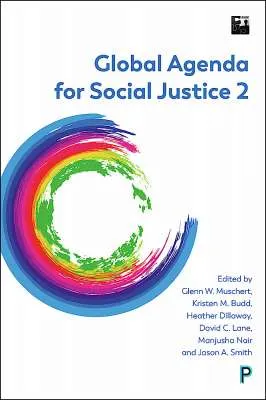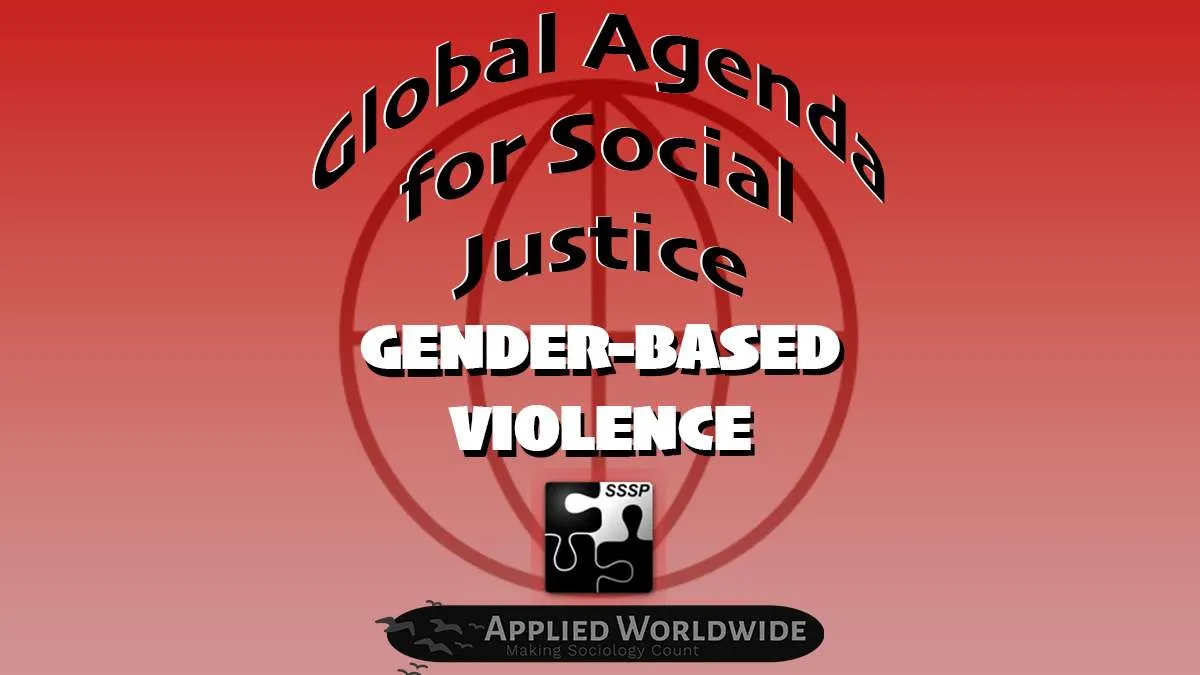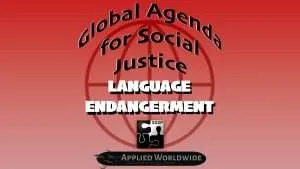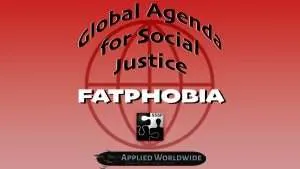Editorial Note:
The society for the Study of Social Problems (SSSP) is the preeminent professional organization for the study of social problems and has recently published the 2nd volume of their Global Agenda for Social Justice. Through collaboration with SSSP, Applied Worldwide is proud to bring you this exclusive interview series providing additional author insights.
This interview covers the social problem of gender based violence against women as discussed by Dr. Ӧzlem Altıok. Get your full copy of Global Agenda for Social Justice 2 here.
Social Problems as Social Justice Issues
Social problems are a major focus in the field of sociology. As described in the editorial introduction to the Global Agenda for Social Justice 2, SSSP shifted focus to not only studying social problem but also searching for their solutions. This new focus came with a wider shift in the discipline of sociology to not only study society, but change it for the better, introducing a social justice focus to the study of social problems.
With our mission to enhance a vision of applied sociology, Applied Worldwide is proud to bring you the following exclusive interview with Ӧzlem Altıok about her chapter on gender based violence against women as a social justice issue in the Global Agenda for Social Justice 2.
How were you introduced to gender based violence against women and what motivated you to study the issue as a sociologist?
Firstly, thank you, on this November 25, the International Day for the Elimination of Violence Against Women, for highlighting my chapter “From the Streets to Social Policy: How to end gender based violence against women” (2022) published in the Global Agenda for Social Justice 2.
Gender based violence against women (VAW) is a global social problem. However, when I was getting my undergraduate work in International Relations in Turkey or my master’s work in Public Administration in the United States, for example, I was not introduced to the issue. I recall no reading material and no discussion whatsoever on it. It was—and still is in many places—possible to not come into contact with a feminist perspective that would highlight VAW as the major social problem that it is.
When I delved into feminist scholarship, during my doctoral studies in sociology in Madison, Wisconsin, I became somewhat aware of gender based violence (GBV) as an important issue, but it was actually in my work as a feminist activist in Turkey that I understood the magnitude of the problem, and began to think of it as a human rights issue. I recall Turkey’s Justice Minister sharing some femicide data in 2009 that showed that there were three femicides a day (!) in Turkey. (There has not been any official and publicly shared data since then, so women’s organizations are doing the job of keeping track based on femicides reported in the media).
As a woman, I knew all too well—and was revolted—that women experienced sexual harassment, stalking, gender based insults and discrimination of various types, and rape. Even so, that women were murdered for wanting to make the most basic decisions about their lives—to marry the person they love or not get married or get a divorce—was unconscionable to me.
How would you describe gender based violence and why is addressing it an urgent concern?
Violence against women and girls is a manifestation of historically unequal power relations between men and women, which have led to the domination over and discrimination against women by men. We have to disrupt those unequal power relations in order to end GBV against women.
Gender based violence against women constitutes a violation of women’s human rights, showing us quite clearly that gender shapes and delimits one’s ability to enjoy those rights we accept to be universal.
Let us take physical and sexual violence specifically. These involve a violation of the fundamental right that people have to life and to live in freedom and safety, to quote from the Universal Declaration of Human Rights (UDHR). VAW is also a direct violation of the right to live free from torture, cruel or inhuman treatment. Really, if we think about the systematic nature of the violence that millions of women endure in many societies, we might begin to see certain kinds of VAW as torture.
Addressing GBV is an urgent concern because we are talking about half of the world’s population being subjected to physical, sexual, economic and emotional/psychological violence.
Gender inequality intersects with other types of social inequalities in patriarchal and capitalist society that produce insecurity, war and poverty. The social problem I focus on in this chapter is gender based violence against women, which shows how women’s human rights are violated on a daily basis. We see this with the prevalence of stalking, early and forced marriage, rape, female genital mutilation, forced sterilization, restrictions on abortions, and femicides. Many of these problems are caused or deepened by poverty and war. They are often justified by patriarchal interpretations of religion or by reference to “custom” or “tradition.”
There is a common perception that VAW is a private matter, that it is something that happens between individual men and women. While it is true that it is individuals who perpetrate and fall victim to (or survive) VAW, the prevalence (globally!) and persistence of the problem shows us that it is a social problem.
What can organizations and communities do to combat gender based violence?
In my chapter, I talk about the Council of Europe Convention on Preventing and Combatting Violence against Women and Domestic violence. The Convention is very practical actually, offering very concrete solutions in its text. The Convention’s four Ps are prevention, protection, prosecution and policies, and specify the kinds of practices and institutions necessary to end VAW. These include specific training to health professionals, law enforcement, judiciary, media and others; shelters; rape crisis centers; safe custody and visitation rights for children; effective police investigations; sex-segregated data collection; and last but not least, the promotion of gender equality.
Ironically, Turkey, which was the very first country to sign the Convention in 2011, thus giving it the short name “The Istanbul Convention,” did something unprecedented: It withdrew from the Istanbul Convention in March of 2021 despite the fact that Turkey’s parliament had ratified the Convention unanimously nine years prior. Turkey’s withdrawal happened through an unlawful decision of President Erdogan, who claims it to be lawful under the new rules of the presidential system he engineered. Remarkably, feminist activists in Turkey continue to contest the legality of the withdrawal on the streets and in courtrooms. They have not given up!
While the Istanbul Convention is an international treaty, and some of its specific provisions make sense at the level of state policy (e.g. prosecution and data collection), any organization can (and should) adopt measures to combat stereotypes in order to change attitudes and gender roles that make VAW acceptable. Any organization can purposefully promote equality and non-violence, and be prepared to respond effectively to gender based violence and to support survivors.
What makes the sociological solutions outlined in your chapter both unique and important?
The very title of my chapter highlights the work of social movements, the women’s movements in particular. As a sociologist, this is the first point I want to make: We have to remember that treaties such as the Istanbul Convention do not happen overnight; and they are not just legal texts. They are products of struggle.
Secondly, I want to say something about the sociological analysis that animates the Istanbul Convention, which sees VAW as rooted in gender inequality. This is a sociological idea through and through: That VAW is a consequence of patriarchy, the historically unequal power relations that subordinate women to men.
It is thanks to the movements that contest these unequal power relations, to feminist ones in particular, that we owe the concept of “violence against women,” which is a relatively new way to think about the problem.
As I discuss in my chapter, until relatively recently, the problem of GBV against women was framed as a private matter. The terms used in the 1970s and 80s were “beating” or “wife battery.” By contrast, concepts such as “gender based violence” and “violence against women” frame the issue as a social problem, implicating social structure and power relations and demanding public recognition as well as resources.
If you had to choose one major take-away from your chapter to share, what would that be?
The feminist motto sums it up, I think: “The personal is political.”
The struggle to end gender based violence against women is part of the struggle to contest and transform unequal power relations in patriarchal and capitalist societies that oppress women and exploit their labor. The struggle to end VAW is a concrete political struggle for a more egalitarian future.

Meet the Author

Dr. Özlem Altıok holds a Ph.D. in Sociology from the University of Wisconsin – Madison. She teaches International Studies and Women’s and Gender Studies at the University of North Texas. A member of Sociologists for Women and Society, and Middle East Studies Association, she studies social movements, as well as the entanglements of politics, religion, and gender across borders. A feminist teacher-scholar, she is also engaged in women’s and immigrant rights advocacy across borders. You can find her on Twitter at @ozthefeminist.
More Interviews from our Global Agenda for Social Justice Series
Applied Worldwide has several interviews with authors writing about different social justice topics around the world. Some of the other topics include fatphobia, language endangerment, and more. View the whole series to see all of the topics on the Society for the Study of Social Problems’ Global Agenda for Social Justice.



